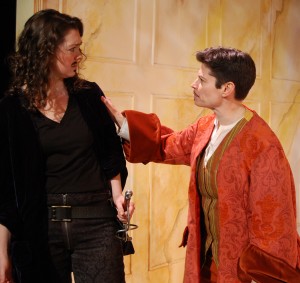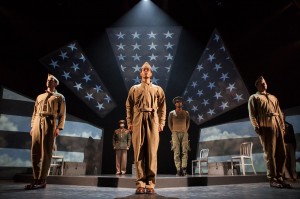The very notion or necessity of taming an outspoken, independent woman—or a shrew—is about as offensive as it gets. It’s a criticism Shakespeare came up against even in his time, so any production today must partly run afoul of such discussion. But Rebecca Patterson has been directing the play long enough to know better. Having first done Taming of the Shrew in 2005 and having workshopped it for the last few years, she’s secure in the knowledge that Shakespeare always moves “toward the light” and doesn’t worry that the real message will be lost.
OffOffOnline: What is your interpretation of The Taming of the Shrew?
Rebecca Patterson: Shakespeare is a humanist. He has extreme compassion for people who are getting the short end of the stick, so this is not a battle of the sexes. It’s about marriage and the oppression that happens at the most intimate of places, which is in our hearts and our bedrooms. On the other hand, he’s also extremely honest, and writing in a misogynistic time. This meant he explored his world but still hoped to shift domination and submission in relationships on a path toward egalitarianism.
OffOffOnline: Are we allowed to laugh?
Patterson: That’s what’s so amazing about the play. It’s dark, it’s dangerous, and it’s funny. Of course, the situation Katherina is caught in is not funny. But one of the most empowering things you can do is laugh or tell a joke. So there are points that are hilarious, but the one thing that is often ignored is the Bianca story. What I’ve done—given the expectations for her suitors—was have her played by a—
OffOffOnline: By what?
Patterson: A blow-up doll.
OffOffOnline: Oh, really.
Patterson [laughing]: Exactly. A blow-up doll is perfect, because she’s what everybody wants her to be.
OffOffOnline: Does she speak?
Patterson: That’s what made it so easy to lift out her lines. She doesn’t really affect anybody and doesn’t have any effect. So people talk around her, but she does speak at the end because even the blow-up doll finds her voice.
OffOffOnline: What are you trying to get across by using an all-female cast?
Patterson: Nothing. One of the things that I’ve found is contemporary women are better able to channel the Renaissance male reality, which is emotionally accessible and strong. Still, Shakespeare is all about humanity—not necessarily men and women. So if we do an all-female cast, it resonates simply as human.
OffOffOnline: Why do you think women have better access?
Patterson: Because contemporary men from a young age are taught not to show their emotion, but the Renaissance man must have a fully expressed emotional life to understand Shakespeare’s journeys. You have to see into their souls, and that degree of inner transparency is easier for contemporary women.
OffOffOnline: How else do you diverge from the original?
Paterson: Shakespeare is like a diamond: there are so many difference facets. But I am true to the words that are spoken. The only thing is I have streamlined some scenes because the theatrical expectations are different from the audience. Still, people always ask if I keep the final scene where Katherina lays out the expectation that women had to be subservient. That’s what he wrote. Shakespeare was being honest, but the play doesn’t end there. We take a modern context. For anybody who’s been caught in a marriage of subservience, there’s a journey that still needs to be taken—especially for the dominator to get to a place where they can truly love.
OffOffOnline: Was Shakespeare the only one who wrote in rhyme?
Patterson: They all wrote that way at the time. It was thought that the elevated speech was how you unleashed the human heart. Shakespeare was just the one who did it best.
OffOffOnline: What if you don’t necessarily speak Shakespeare. Can you still enjoy this?
Patterson: My actors are extremely talented and well trained classical actors. So people walk out of our play, and say, “I’m impressed how you updated the language.” But we don’t. The trick is you have to find the rhythms of the language. I liken it to rap. So we make him strut, and the consonants and vowels actually reach inside of us to play our hearts.
OffOffOnline: How do you see your role as a director?
Patterson: My actors see the text as I do, so all I do is guide them to places where there might be a misinterpretation. It’s less about doing it wrong, and more about “There’s something else here” or “I don’t think this is what the moment is about.”
Tickets can be purchased by calling OvationTix at (866) 811-4111 or online at web.ovationtix.com/trs/cal/621/1459483200000. The Taming of the Shrew runs through May 1 at the Wild Project (195 East 3rd St. between Avenues A and B) in Manhattan.
Performances are at 8 p.m. Tuesday through Saturday and 3 p.m. on Sunday.









